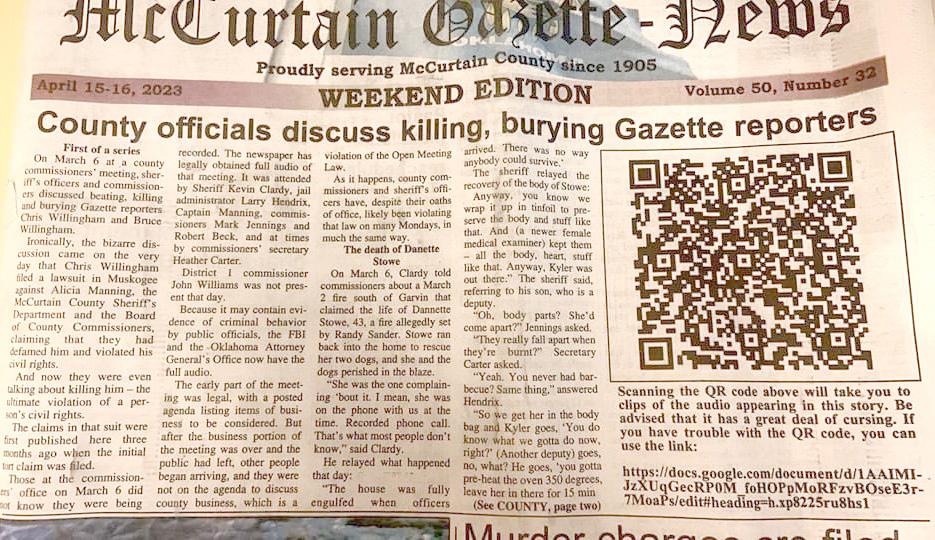
3 minute read
Journalism Days being held at University of Arkansas this week
More than 600 Arkansas high school journalists are on the University of Arkansas (U of A) campus as part of Journalism Days, an annual tradition in the School of Journalism and Strategic Media (SJSM) in partnership with the Lemke Journalism Alumni Society, April 18-22. Events include an open house, scholarship reception, guest speakers and the Roy Reed Lecture.
The lecture honors Roy Reed, a New York Times reporter from 1965-1978 who taught journalism for 16 years at the U of A. Antoinette Grajeda, Arkansas Advocate senior reporter, and Rusty Turner, Northwest Arkansas Democrat-Gazette executive editor, gave the joint lecture Tuesday to a class of 150 journalism majors. Both are graduates of the journalism school with standout careers in reporting. Turner, an APA Past President, is retiring next month after a 40-year career in journalism in Northwest Arkansas and the River Valley.
Advertisement
"Antoinette and Rusty are leaders in Arkansas journalism. In the Roy Reed tradition, they are dedicated to seeking the truth and to building the profession by giving back to the younger generation of journalists,'' said Larry Foley, chair of SJSM. "Roy Reed was a legendary reporter and beloved professor. I'm so glad we can carry on his tradition with this lecture series.''
In addition to Journalism Days, the Arkansas Scholastic Press Association (ASPA) brought teachers and high school students to Fayetteville for its convention, which started on Wednesday. ASPA was founded by Walter J. Lemke, who also founded the journalism school.
Rounding out the week of journalism-related events is the Society of Professional Journalists region 12 conference on Friday and Saturday for college journalists, educators and reporters from Arkansas, Louisiana, Mississippi and Tennessee.
"The U of A is positioned to recruit young journalism talent and provide top opportunities for our students and graduates,'' said Gina Shelton, campus adviser for the Society of Professional Journalists (SPJ) and president of the Northwest Arkansas pro chapter. "Our school is engaged at every level.''
More about J-Days: For updates, news and reminders about all J-Days events, visit the Lemke Journalism Alumni Society website at www.arkansasalumni.org/lemkesociety.
More about ASPA, the high school journalism association founded by Walter J. Lemke: www.arkansasscholasticpressassociation.org.
More about the Region 12 SPJ Conference, the Art of Journalism: region12conferencespj.wordpress.com
Okla. county officials accused of planning reporters' murders
The Governor of Oklahoma has called for the resignation of four McCurtain County officials after a recording of them discussing the murder-for-hire of local newspaper reporters and making racist comments came to light.
The recording was captured by McCurtain Gazette-News reporter Bruce Willingham, whose family owns the newspaper. McCurtain County is located in the far southeast corner of Oklahoma and borders Arkansas and Texas.

McCurtain County Sheriff
Kevin Clardy, MCSO
Captain Alicia Manning, Jail
Administrator Larry Hendrix and County Commissioner
Mark Jennings are accused of discussing plans to beat, kill and bury two Gazette-News reporters and lamenting that modern justice no longer includes lynchings.
Willingham said he left his recording device inside a McCurtain County commissioners' meeting on March 6 after receiving a tip that the commissioners were illegally engaging in county business after the public meetings were adjourned. When he retrieved the device he discovered more than three hours of audio recordings that include discussions about hiring hitmen, where the reporters' bodies could be buried, derogatory and racist comments about the local Black community and describing a woman who recently perished in a house fire as “barbecue”.
“I am both appalled and disheartened to hear of the horrid comments made by officials in McCurtain County,” Okla Gov. Kevin Stitt, a Republican, said in a statement on April 17. “There is simply no place for such hateful rhetoric in the state of Oklahoma, especially by those that serve to represent the community through their respective office.”
Willingham turned the full audio over to the FBI and the Oklahoma Attorney General's office. The investigation is ongoing.
Everyone needs an editor. I can assure you that for every story of a writer done wrong by an editor, there are at least three editors over in the corner raging and cursing a long list of writers who don't spell-check or fact-check, don't know versus and verses (and other homonym sets) mean different things and, worse yet, don't take kindly to being edited.
Over the years I've dealt with just about every type of writer one could imagine. Back when I was on the night copy desk editing news stories, I was usually the one who dealt with a certain reporter because others didn't want to; the writer rechecking his story after it had been lineedited annoyed those who just wanted to move copy. I didn't mind, though, because the reporter just wanted to make sure that nothing that had been changed made the story incorrect.
A particular turn of phrase wasn't the worry; whether readers understood the story and got accurate information was. Very rarely did that reporter have to have a correction run.
Another writer, on the other hand, was hostile to editing. That person had to run more corrections than most.
Professional writers have the benefit of professional editors; it's unwise to waste that resource. A good editor does more than just check grammar and spelling, but will push the writer to do better. On the news side, it's important to make sure the writer didn't bury the lede, has checked all facts, and has kept his or her opinion out of the story. On the opinion side, there's more leeway, but it should still be clear when the writer is expressing opinion, especially if they write reported opinion, as John Brummett does. Fact-checking is







